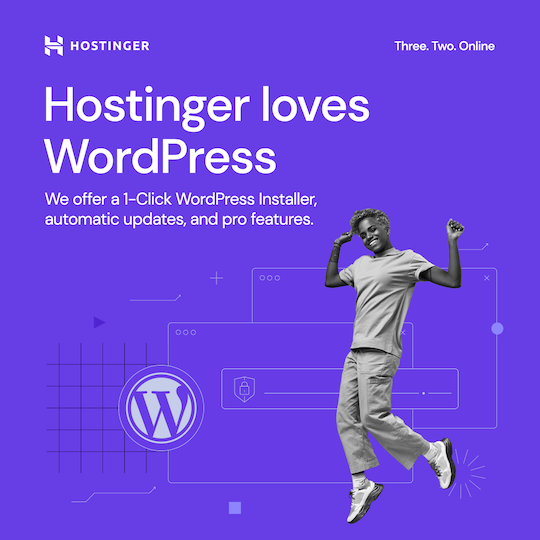If you are wondering if WordPress is the best platform for you to use, in this article I am going to answer the question of whether is WordPress outdated or is still relevant today.
In short: No, WordPress is not outdated.
It remains one of the most popular and widely used content management systems globally.
With continuous updates and a vast ecosystem of plugins and themes, WordPress offers a flexible and powerful platform for building and managing websites.
I will be breaking down the pros and cons of this software and hopefully, by the end of your reading, you’ll be able to decide whether to use WordPress or not.
What is WordPress
WordPress is a free and open-source content management system (CMS) that was initially created as a blog-publishing system; released in 2003 by Mike Little and Matt Mullenweg, its founders.
Today, WordPress powers over 40% of websites across the web all over the world.
The WordPress publishing software can be installed locally on a web server and viewed on a proprietary website, or it can be hosted in the cloud and viewed on the WordPress website.
WordPress is supported by a vast community of skilled, devoted developers, designers, scientists, bloggers, and more.
It provides an opportunity for anyone, even people with limited technical expertise to build amazing websites.
To operate, WordPress has to be installed on a web server, either as part of an Internet hosting service like wordpress.com or on a computer running the software package wordpress.org to serve as a network host.
Also, a local computer can be used for single-user testing and learning purposes.
WordPress Cons
First, let’s look at some of WordPress’s shortcomings that make people think twice about using WordPress:
- Security
Apparently, in 2018 WordPress accounted for 90% of hacked CMS websites.
This was attributed to vulnerabilities in plugins and themes, misconfiguration issues, and ultimately lack of maintenance.
WordPress’s popularity makes it a target for hackers; when they spot any vulnerabilities in the themes and plugins, they do not hesitate to exploit them and gain access to numerous websites.
- Need for Plugins
With WordPress, you need a plugin for almost all of the basic functionalities of your website.
Although you can easily find a suitable plugin for every purpose, installing and running too many plugins will hinder your website’s speed and you may run into compatibility issues.
Even though WordPress offers thousands of free plugins, you might need to purchase premium versions if you want to stand out and enjoy more advanced features.
These subscription-based paid plugins may increase your website’s operational cost drastically.
- Slow Speeds
A fast-loading website helps your Google rankings and prevents your visitors from becoming impatient and rebounding to another website.
WordPress also takes more server resources and sometimes has redundant code, which results in a slow-loading website.
Additionally, the use of multiple plugins or heavy themes makes WordPress websites even more sluggish.
Why is WordPress Still Used Today
So after seeing the above, you’re probably wondering ‘Is WordPress worth it?’
Well, despite WordPress’ shortcomings, it is still a very popular software/content management system today because of its numerous features.
Let’s look at some of the WordPress features that make it stand out:
WordPress’s Flexibility and Versatility
WordPress is so flexible that you can do almost anything with your website using plugins.
There are hundreds of WordPress plugins like contact forms, payment gateways, eCommerce plugins, podcasts, landing page plugins, etc, not forgetting the themes and templates, all customisable.
You can use these to extend the functionality of your WordPress and build the website of your dreams.
With WordPress, you can customize your WordPress and create blogs, magazines, forums, eCommerce shops, and anything else you can think of.
You also have the freedom to choose any hosting provider you like, or even migrate your website with all your data from WordPress to any other hosting provider you want.
WordPress is Free
WordPress is an open-sourced software, which makes it free to download, install and use.
You can modify it, build upon it, and redistribute the software in any way you like without paying any fees.
However, other costs are involved in other areas, like web hosting fees, premium WordPress themes, and plugins.
WordPress is SEO Friendly
WordPress automatically alerts Google every time you update your website, causing recent blogs to move up the ranks in Google search results.
This and several other reasons are what make it SEO-friendly.
It’s also easy to connect with powerful Search Engine Optimization (SEO) plugins like Yoast SEO, Schema Pro, and AIO SEO.
WordPress’s Endless Design Options
Using WordPress themes, you can tweak your website’s design and make it look like whatever you want.
Themes help you make your website your own, even if you’re a non-technical person.
You can choose from thousands of captivating designs with a wide variety of features and customization options.
Typically, you can find WordPress themes for free, but the premium (paid) ones often provide better features and quality support.
WordPress’s WooCommerce Integration
If you’re building an online store or an eCommerce website, you can do this rather easily by using WooCommerce, which was built on WordPress.
With WooCommerce, you can particularly turn your regular WordPress website into a functioning online store, with payment processing, a shopping cart, and product galleries.
You can do this by simply adding a WooCommerce store to your WordPress website.
Then you can explore your eCommerce opportunities through drop-shipping or selling your products and services.
WordPress Security
WordPress was created with security in mind, and it is considered to be a very safe and secure platform to run a website.
It also provides you with several powerful security plugins to keep your site nice and safe.
WordPress Community
Because so many people use WordPress, the community surrounding it has built a ton of helpful resources that are remarkably beneficial to anyone doing website work.
This is especially advantageous for beginners.
It’s as easy as googling the issue and surely a forum or thread will show up where someone went through the same experience and have an answer for you.
You can also join the WordPress team and be part of the development, design, documentation, support, etc, giving you a great overall user experience.
WordPress Social Media Integration
WordPress has several social media plugins that you can use, and many ways to integrate your social media accounts, like Facebook, Instagram, and Twitter(X), with your website.
Furthermore, WordPress enables you to engage with your potential customers by sharing your products on your social media via your website.
This helps in expanding your product sales and growing your website traffic and social media following.
Additional WordPress Features
- One of the most useful features of WordPress is that it enables you to create websites that are automatically responsive.
With its responsive mode, you can test and see how your website looks on desktop, tablet and mobile.
- WordPress supports numerous media files like images, videos, documents and audio.
You can expect to upload common files like .jpg, .png, .gif .pdf, .doc, .pptx, .mp3, .m4a, .mp4, .mov, .wmv, and .avi.
Along with some obscure file types like .odt, .key, .ogg, and .3gp.
Likewise, even some file formats like SVG that aren’t allowed have provisions to get around and be safely uploaded on WordPress.
Note: While WordPress supports pretty much any type of media, you still need to follow the rules and only use media that’s either owned by you, open for free download, or usable when credit is given.
- The WordPress code complies with the W3C standards. This means that your WordPress website will work on any browser and maintain forward compatibility with the next generation of browsers.
You will be able to use Google Chrome, Mozilla Firefox, Safari, Edge, Opera etc.
- With WordPress’s user-friendly interface, you will be able to add extra fields to your website.
It comes with custom content fields that you can add a few lines of code to and create your custom post types, taxonomies, and metadata.
Custom fields allow you to create complex fields and layouts, and you can use the advanced custom fields plugin to take full control of your WordPress site.
- WordPress is very easy to install and upgrade. All you need to do for the installation is create a database and run the WordPress files.
- WordPress also enables you to update your website plugins and other features and, if you get any issues after the update, you can just disable the plugins.
Is WordPress Still Relevant?
WordPress’ relevance continues to be a topic of discussion among experts and technology enthusiasts.
However, with the constant evolution of website-building technology and the emergence of new CMS platforms and website builders, some sceptics question whether WordPress will remain relevant in the coming years.
Despite the growing competition, WordPress remains a prevalent choice for individuals and businesses alike due to its user-friendly interface, robust plugin ecosystem, and extensive customization options.
The availability of numerous themes and templates, as well as the extensive developer community, contribute to its enduring popularity.
Additionally, WordPress’s adaptability to different types of websites, such as blogs, e-commerce, and portfolios, further solidifies its position as one of the leading CMS platforms.
While the future is uncertain and trends may shift, it is evident that WordPress’s relevance remains steadfast and its user base continues to thrive.
Thus, whether WordPress will retain its relevance going forward largely depends on its ability to adapt to emerging technologies and address the evolving needs of website builders and content creators.
FAQ
How does WordPress address security in 2024?
The platform’s admin dashboard is protected with a login page that requires WordPress users to enter a valid username and password.
Additionally, it gets regular patches and updates to eliminate any security issues and vulnerabilities.
What factors should I consider when evaluating WordPress in 2024?
Consider factors like updates, community support, competing technologies, security measures, and scalability for your project’s specific needs/requirements.
In Conclusion
So, for queries like ‘Is WordPress old technology?’ or ‘Does anyone use WordPress anymore?’:
Yes, WordPress is not perfect, but with all the upside features we’ve looked at above, I think we can undoubtedly conclude that it is still very relevant today, and it continues to grow even as we speak!
If you do choose to use WordPress to build your website, make sure you keep your software, plugins and other features up to date for optimal performance.
Additionally, familiarize yourself with the common WordPress security vulnerabilities so that you can take active measures to protect your website when the need arises.



